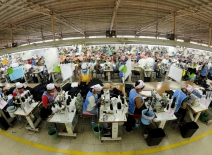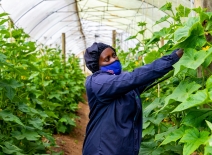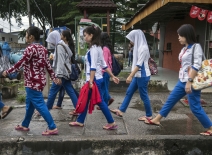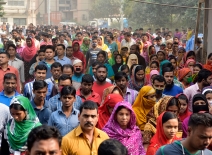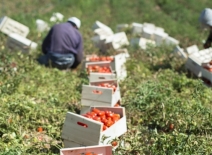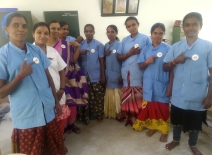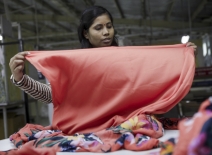Where we’re driving change
During 2020-21, ETI had 16 live programmes, produced 29 resources, held 52 webinars and published 103 blogs.
Covid-19 response
In response to the immediate disruption caused by the Covid-19 pandemic, ETI supported its members with up-to-date guidance and briefings. In the face of extreme circumstances, we developed a series of enhanced expectations on responsible business for our corporate membership, against which we surveyed members to better understand corporate behaviour, the challenges faced and identify areas requiring individual and collective support. The survey was completed by 82% of our corporate membership and the results provided a snapshot of the situation between March and September 2020, underscoring the stark situation for workers in supply chains. By holding members to account and sharing good practice, ETI was able to influence some members to adapt their approach following the initial fallout.
According to survey results, by September 2020 81% of participating members had paid for all finished products received since 1 March 2020. Despite this, only 25% could guarantee they had paid for all goods not yet dispatched. We also found that only 27% of participating members engaged with all their suppliers during this global health crisis, to ensure workers did not suffer any penalty for refusing to work due to actual or perceived risk of Covid-19 infection.
The pandemic led to big profits for some corporations and direct threat of closure, including tough decisions around redundancies and furlough, for others, particularly those with high street stores. ETI was disappointed by the conduct of brands across industries during this period. Both within and outside of the ETI membership many companies took too long to adapt and mitigate the impact of supply chain disruptions in ways that focused on people, not just profit. In response, the ETI secretariat used survey data to inform our advice to members, our programmatic work going forward and our advocacy for workers’ rights worldwide.
There is no doubt that conditions for business, both in terms of supply and demand, were uniquely challenging in 2020-21. However, for too many businesses the initial reaction was to take unilateral action without thinking of the implications along the supply chain for suppliers and vulnerable workers. We can note that after this initial reaction many businesses made significant efforts to address the inadvertent impact, but real lessons have to be learnt for the future.
Peter McAllister, Executive Director, ETI
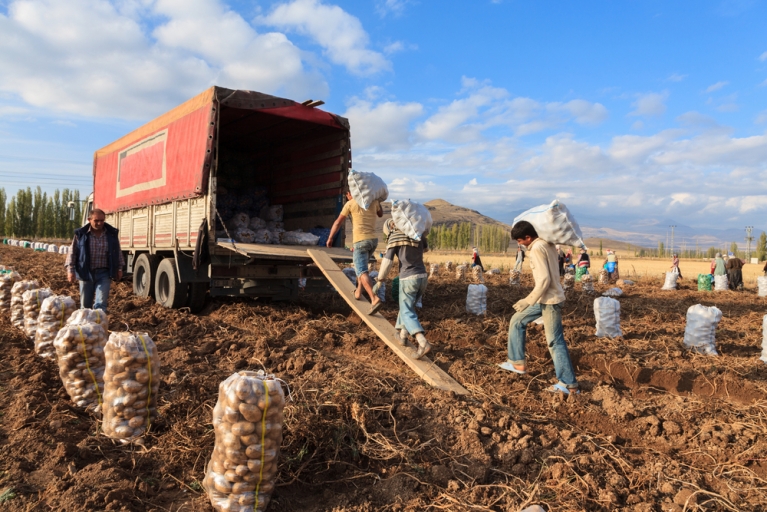
Agricultural workersh arvesting potatoes
Building partnerships
To maximise our impact during Covid-19, ETI worked closely with multi-stakeholder initiatives and other key stakeholders to collaborate and grow our network of influence. These included Fair Wear Foundation, the Food Network for Ethical Trade (FNET), the Deutsche Gesellschaft für Internationale Zusammenarbeit GmbH (GIZ) and other ethical trading initiatives in Denmark, Norway and Sweden.
In collaboration with FNET, ETI hosted regular webinars linking companies with local speakers on common employment themes and supply chain challenges across a series of time zones. This provided a timely focus on emerging needs by offering a platform to suppliers and third parties such as NGOs and trade unions. This helped to ensure needs along supply chains were heard and constructive engagement could follow. Over 1,000 stakeholders across Africa, Latin America and South East Asia participated online, supporting factories and farms as the pandemic moved to hit countries during harvest. ETI was able to draw on its extensive global network of members and wider associates to help local actors be heard and to ensure that FNET, ETI and wider resources – such as those of the International Labour Organization, the Association of Labour Providers and trade unions – were shared as widely as possible. Narratives shared by participants provided live reports of local responses to Covid-19 challenges, gaps in knowledge or action, and helped shape company responses.
Building strategic partnerships during this turbulent time enabled ETI to support a larger number of suppliers and facilitate better working conditions at a greater pace and scale than ever before.
In 2020 ETI’s direct Covid-19 initiatives reached 59,220 workers in Bangladesh and East and Southern Africa, 28,140 of which were women workers.
By challenging, supporting and learning from our members during this period, ETI was able to guide brands on responsible business behaviour, developing practical resources and holding issue-specific webinars. All of these, alongside relevant news and good practice examples, were published on our Covid-19 issue page, which received over 4,000 returning visitors and more than 2,800 new visitors during the period.
Collaboration with FNET during the Covid-19 crisis was an entirely positive step for ETI – and I believe also for FNET. There was a clear common purpose and commitment that made collaboration both easy and effective in its impact.
ETI works best when collaborating with others. The world in the 2020s is a very different place to when ETI was originally formed. The landscape is now well covered with activities that support ethical trade challenges, but there is a risk that activity alone may detract from effective industry and systems change. ETI and FNET worked well together to increase our mutual understanding of this complex landscape.
Nick Knightley, former Strategic Lead: Food, Farming & Fisheries, ETI
The Vulnerable Supply Chains Facility
The Vulnerable Supply Chains Facility (VSCF) was a rapid Covid-19 response fund set up by the UK Foreign, Commonwealth and Development Office (FCDO), and managed by Mott MacDonald Ltd.
As one of the Facility’s 20 UK and international partners, ETI implemented two Covid-19 response and recovery projects from 2020-21 – one in the garments sector in Bangladesh and one in the agriculture sector in East and Southern Africa.
Many trainings are provided in our factory, but the tablet-based training was totally different and new to all of us, which created interest among the workers and also a willingness to participate and learn.
Hasifa Mamtaj, female employee, Ananta Huaxiang Ltd, Bangladesh
The overall quality of my life has very much improved because, by returning to work again, I am guaranteed I will be able to earn some income that will help to support my family. Training has helped us to manage our finances better and helped to protect ourselves and our families from [Covid-19].
Anonymous, female participant, VSCF Training Session, Kenya

Climate change is already impacting on agriculture
In response to both the Covid-19 and climate crises, ETI established the workstream Transitions and Futures. This strategic programme of work drives tripartite collaboration to develop solutions to manage and mitigate the impact of climate change on workers and businesses.
The programme has shaped ETI’s thinking on the future world of work and discussed emerging issues with our members both one-on-one and via virtual member events with thought leaders.
Being faced with seismic changes that threaten our world and workers’ rights creates both challenges and opportunities. In a post-pandemic world we have the opportunity to build back better and maximise the opportunity to re-imagine a world of business that respects planet and people. Whether future supply chain disruption is caused by emerging technology or devastating climatic events, developing our HRDD approach ensures preparation for change that respects worker voice and authentic participation in future plans.
Beverley Hall, Senior Transitions Advisor, ETI
It was the start of the journey for us mapping our shipping providers. We had obtained data on our shipping providers but needed to know how to interpret the information and how this tied into our HRDD processes. The health check made sense of what we were looking at and provided evidence to raise with our company board. For us, having the health check was a way to get real-time information from the source, having access to the crew members’ voices both through auditing and trade union representation. And most importantly we were able to access expert advice and the prospect of going beyond the audit and offer access to remedy where immediate workers assistance is needed.
Francesca Mangano, Head of Sustainability and CSR, The Foschini Group
This is the only initiative in the clothing and footwear industry that looks at social, environmental and commercial with equal prominence, placing particular emphasis on commercial practices as key to unlocking social and environmental progress.
Olivia Windham Stewart, Independent Consultant, TIWW
ETI has been perfectly placed to work within the Apparel and General Merchandising Public and Private Protocol and bring together brands, trade unions, civil society, community groups and charities to develop a programme of work addressing workplace rights in the UK Garment Sector. As a result, it has funded two outreach workers who developed the Fashion Workers Advice Bureau – a community-based support and advice service for workers in the garment industry in Leicester. More recently, ETI’s experience of working with trade unions and brands has helped guide the development of a UK binding agreement.
Heather Webb, Established Ethical Trade Partner, ASOS
We are glad that workers in Malaysia, or looking to come work in Malaysia, now have easy access to information about their rights via the Just Good Work app. The app has also made it easier for workers to reach out to us when they face issues, whether personal or at work.
Sumitha Shaanthinni Kishna, Director, Our Journey
I was of course happy to get elected, but I actually didn’t know what our rights were and what I could and couldn’t impact or say in my new elected role. And I did not know how I should articulate myself and speak to the management. It all made me really, really nervous and instead of making me stronger, I actually became increasingly less confident. I am grateful to ETI for providing me with the opportunity to develop my skills and knowledge [in this area] and helping me get my confidence back – the training has done the trick to help me overcome some personal barriers!
Abeda Akhter, newly elected participation committee member, Social Dialogue Training Session, Bangladesh
Princes is delighted to have been a founding member of the Italy working group to collaborate with like-minded stakeholders to tackle salient human rights risks affecting Italian agriculture. The insights from the working group have provided us with the confidence and purpose to systematically improve the ways in which we work with our growers, processors and co-operatives in Italian tomato procurement. Through the engagement of ETI, we have been able to assess how purchasing practice improvements can directly lead to better working conditions for vulnerable workers.
Paul Williams, Head of Environmental & Social Sustainability, Princes
This programme has helped the personal development of peer educators and workers. The peer educators not only have improved themselves, but have also helped to improve their co-workers. They are becoming true representatives of the Nalam programme. I am happy about it. The ETI team has put forward so many recommendations to us for the improvement of the mill systems, which we have incorporated. Our wish is that this is sustained. We will work on it.
Anonymous, participant, TNMS Exit Meeting, India
The Covid-19 pandemic has been devastating to supply chain workers worldwide, but women workers have been disproportionately affected. ETI worked hard throughout this year to build an understanding and approach across all its work that includes and accounts for their impact on women workers. All too often the response to gender inequality results in narrow, targeted bodies of work, focusing solely on women. Whilst these interventions are incredibly important, it is crucial that all our work includes a gender analysis, to avoid unintentionally exclusionary or negative impacts through a lack of consideration of women's needs.
Clare Fitton, Impact Advisor and Gender Programme Manager, ETI

